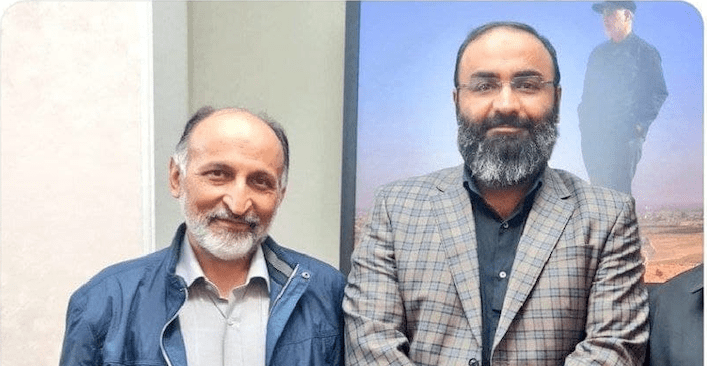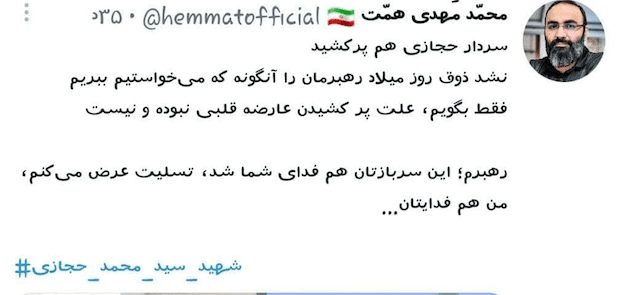EXECUTIVE SUMMARY:Muhammad Hejazi, deputy head of the Iranian Quds Force, is reported to have died of heart disease. However, a mysterious tweet hints that he might have been killed.
On Sunday, April 18, the media arm of the Islamic Revolutionary Guard Corps (IRGC), Sepah News, announced the death of Brigadier General Muhammad Hosseinzadeh Hejazi, deputy head of the IRGC’s external branch, the Quds Force. The news agency said Hejazi had succumbed to a heart condition.
But hours after the news broke, Muhammad Mehdi Hemmat, the son of the late Muhammad Ebrahim Hemmat, tweeted a condolence that read: “I just want to say that the cause of death was not a heart condition. My leader, this soldier of yours [was]sacrificed for you, I offer my condolences, I also sacrifice myself for you.”
Hemmat’s father, Muhammad Ebrahim, was a high-ranking IRGC commander who participated in the 1982 Lebanon War and was later killed during the Iran-Iraq War. Because his father was so closely linked to the Islamic establishment, Muhammad Mehdi Hemmat’s tweet is attracting media attention inside Iran.
Who was Muhammad Hejazi?
Muhammad Hejazi was born in Isfahan in 1956 and held a PhD in strategic management from the Supreme National Defense University. After the victory of the Islamic Revolution in 1979, Hejazi joined the IRGC and was active in fighting the 1979 rebellion in Iranian Kurdistan.
For nearly a decade, between 1998 and 2007, Hejazi was commander of the Basij, the paramilitary unit of the IRGC responsible for putting down unrest inside the country. Between 2008 and 2009 he was Deputy Commander- in-Chief of the IRGC. He also served as head of the Joint Staff of the IRGC.
After leaving his post as Deputy Commander-in-Chief, Hejazi was appointed head of the Tehran branch of the IRGC. He was instrumental in the massive crackdown on the post-election protests of 2009, during which an unknown number of protesters was killed by the IRGC and Basij militias. Because of his role in the crackdown, Hejazi was sanctioned by the EU in October 2011.
After the January 2020 slaying of Qassem Soleimani, the infamous Quds Force chief, Brigadier General Esmail Qaani was appointed to replace him as head of the organization and Hejazi was named deputy head. Hejazi’s appointment was little surprise, as he had substantial operational experience overseas. For an unknown period of time, he was head of the IRGC in Lebanon. When the Syrian Civil War began in 2011, he was summoned to Syria by Soleimani to coordinate assistance of the IRGC and Lebanese Hezbollah to the Assad regime.
In August 2019, the Israeli Defense Forces revealed that Hejazi was one of three senior IRGC officers involved in developing precision-guided missiles for Lebanese Hezbollah.
Three possible scenarios to explain Hejazi’s death
The tweet by Muhammad Mehdi Hemmat cannot be ignored, and his choice of words warrants close examination. He claims that Hejazi’s death was not caused by a heart condition, which naturally prompts the question of what really caused his death. He then uses the word ”sacrifice”. Sacrificed in what way?
There are three possible explanations for what might have happened to Hejazi:
- He was killed during an overseas operation in Lebanon or Syria.
- He was assassinated inside Iran by a foreign country or opposition group.
- He was murdered by the regime itself.
Iran has experienced massive intelligence failures over the past few years, and the recent sabotage of the Natanz nuclear facility is still vivid. The Islamic regime cannot and will not confess that yet again, it has failed to secure one of its most important assets. This is particularly important if scenario number two turns out to be the reality.
With respect to scenario one, it is even more important for the Islamic regime to keep the death of Hejazi a secret. Admitting he was assassinated in a foreign country would not only mean admitting that Iran is incapable of protecting its high-ranking officers, but would also entail an acknowledgement of Iran’s presence and malign activities in the country in question. Either of the two first scenarios could explain why Hemmat chose to use the word “sacrifice”.
As for scenario three: The Islamic regime has a history of eliminating its own servants, as was seen in the case of the late Saeed Emami; but in view of Hejazi’s position in the Islamic Republic, it is highly unlikely that the regime itself eliminated him. Even if it did, it is most unlikely that Hemmat would have any knowledge of what would undoubtedly have been a top secret operation.
Whatever happened to Hejazi, the regime will now need to counter Hemmat’s tweet. Tehran will likely use its appendages as well as social media to spread the claim that Hejazi died of COVID-19, which in and of itself would be a blow to the regime’s reputation and would explain its desire to keep the matter quiet.
Dr. Ardavan Khoshnood, a non-resident associate at the BESA Center, is a criminologist and political scientist with a degree in Intelligence Analysis. He is also an associate professor of Emergency Medicine at Lund University in Sweden. @ardavank


